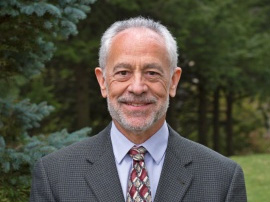
Christopher Dunn, executive director of Cornell Botanic Gardens, received the Award of Merit from the American Public Gardens Association June 20 in recognition of his distinguished performance in the field of public horticulture at one or more institutions.
Dunn has served as the Elizabeth Newman Wilds executive director of Cornell Botanic Gardens since 2014. He guided it through an extensive rebranding effort that resulted in the renaming of the organization from Cornell Plantations to Cornell Botanic Gardens. The name change positions the organization to better advance its mission and vision.
Cornell Botanic Gardens is a unit of the College of Agriculture and Life Sciences and is integral to the physical presence, student experience and research activities of the university. It is in the vanguard of advancing the understanding of the role of plants and the cultures they sustain.
“With his background in plant ecology and conservation, Christopher has a broad view of issues that relate the plant world to the role of botanic gardens in local and global plant conservation efforts,” said Kathryn J. Boor, the Ronald P. Lynch Dean of the College of Agriculture and Life Sciences. “Under his direction, Cornell Botanic Gardens is playing a leading role in biocultural conservation, through programs and outreach.”
Dunn is a leading voice for biocultural diversity worldwide. He serves on the board of directors of the International Union for Conservation of Nature-U.S. (IUCN). In 2016, he coordinated the IUCN World Conservation Congress, the largest conservation conference ever held in the U.S. He also serves on the board of directors of the Center for Plant Conservation, based in California.
Prior to joining Cornell Botanic Gardens, Dunn held leadership positions at Lyon Arboretum (director, 2007-14), Chicago Botanic Garden (executive director for research, 2004-07) and the Morton Arboretum (1994-2004). He holds academic appointments at Cornell as adjunct professor in the Horticulture Section of the School of Integrative Plant Science and a faculty fellow at the Atkinson Center for a Sustainable Future.
His accomplishments in the public garden field include programs that provided trees to local and regional communities, and the development of new research institutes, university partnerships and programs across disciplines. These include partnerships with the Smithsonian Institution’s National Museum of Natural History and Google’s endangered languages project with linguistics faculty at the University of Hawaii, Manoa.
Cornell Botanic Gardens oversees 3,500 acres of cultivated gardens, the arboretum and natural areas that comprise one-third of the Ithaca campus, as well as off-campus natural areas.
Author Shannon Dortch is associate director of communications and marketing for Cornell Botanic Gardens. This article also appeared in the Cornell Chronicle.


